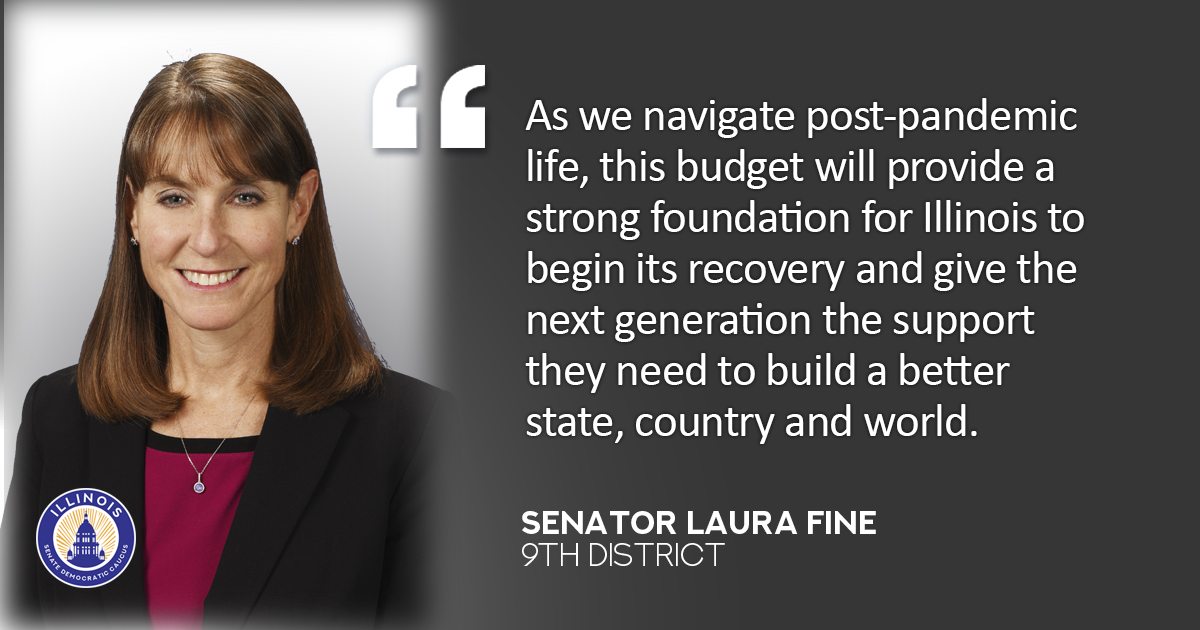- Details
- Category: Press Releases
 GLENVIEW – A free online job training program could help millions of out-of-work Illinoisans prepare for a new career in the information technology industry, State Senator Laura Fine (D-Glenview) announced.
GLENVIEW – A free online job training program could help millions of out-of-work Illinoisans prepare for a new career in the information technology industry, State Senator Laura Fine (D-Glenview) announced.
“Information technology is one of the fastest growing industries, and skilled workers are in high demand,” said Fine. “The Workforce Recovery Initiative could give Illinoisans a leg up when starting a career in the field.”
Partnering with Coursera, an online learning platform, Illinois is one of the first states to make online job training courses free to residents through their Workforce Recovery Initiative. Now through September residents can apply online to enroll in over 3,800 industry-certified courses offered by accredited institutions. To receive credit, all courses must be completed by Dec. 31.
The state is also partnering with P33 and Discovery Partners Institute (DPI) to launch another training program, TechReady Illinois. This program will provide training for in-demand fields in the information technology industry. Upon completion, enrollees will be certified in data and analytics, cloud computing, cybersecurity or software development. Residents can apply online for the TechReady program here. TechReady Illinois is not a free program like Coursera, but DPI is working secure discounts for enrollees.
If you are interested in career opportunities outside the information technology industry, Get Hired Illinois is an online job portal that has over 60,000 listings available in a variety of industries.
- Details
- Category: Press Releases
 GLENVIEW – As businesses and offices prepare to reopen, State Senator Laura Fine (D-Glenview) hopes to put parents at ease by announcing a plan to allow child care centers across Illinois to reopen with guidance from the Illinois Department of Public Health (IDPH).
GLENVIEW – As businesses and offices prepare to reopen, State Senator Laura Fine (D-Glenview) hopes to put parents at ease by announcing a plan to allow child care centers across Illinois to reopen with guidance from the Illinois Department of Public Health (IDPH).
“No one should have to choose between doing their jobs and looking after their children, and parents should be able to rely on their child care centers to keep kids healthy and safe,” said Fine. “I hope this new plan will provide them some peace of mind.”
All child care facilities will be able to open under Phases 3 and 4 of the governor’s reopening plan, as long as they adhere to the guidelines set by IDPH and create a reopening plan that protects the health of both children and staff.
That plan must include what to do if a child or staff member tests positive for COVID-19, daily symptom checks and a face covering requirement, among other things.
No more than 10 children will be allowed in a classroom at a time for four weeks. After that, if the center has met proper health, social distancing and sanitation requirements, it will be able to expand to larger group sizes.
Additionally, child care programs that have been open since the start of the Stay at Home Order will be allowed expand capacity as their region enters Phase 3.
“During this pandemic, many parents have had to balance full-time work, parenting and homeschooling,” said Fine. “Opening daycares will give moms and dads a break and ensure that kids are getting more of the one-on-one engagement they need throughout the day.”
All regions of the state have been approved to move to Phase 3 starting today.
- Details
- Category: Press Releases
 GLENVIEW – As offices and businesses across the state begin to reopen under new health and safety guidelines, the Illinois Secretary of State will reopen driver services facilities to offer limited services starting June 1, State Senator Laura Fine (D-Glenview) announced Wednesday.
GLENVIEW – As offices and businesses across the state begin to reopen under new health and safety guidelines, the Illinois Secretary of State will reopen driver services facilities to offer limited services starting June 1, State Senator Laura Fine (D-Glenview) announced Wednesday.
“There’s no rush to get to a facility, since expiration dates have been extended and services are still available online,” said Fine. “But it’s good to see the Secretary of State’s office reopening their facilities with employees’ and customers’ safety in mind.”
All Secretary of State departments and offices will reopen for business starting June 1. Driver services facilities across the state will reopen the first week of June with expanded hours of operation. Through July 31, these facilities will only serve new drivers, customers with expired driver’s licenses and ID cards, and vehicle transactions. Find nearby locations, opening dates and hours using the Secretary of State’s Facility Finder tool.
To ensure current documents remain valid and lessen the rush of customers when these facilities open, the Secretary of State has extended expiration dates for driver’s licenses, IDs and vehicle registrations by at least 90 days after the governor’s disaster proclamation ends. The federal deadline to obtain a REAL ID has also been extended to October 1, 2021.
Residents are still encouraged to visit www.cyberdriveillinois.com to avoid waiting in line and take advantage of online services, including replacements and renewals of registrations, driver’s licenses and ID cards.
- Details
- Category: Press Releases

“The COVID-19 pandemic clearly demonstrates that we must make sure all Illinoisans have the tools they need to face critical and unexpected challenges.
“As we navigate post-pandemic life, this budget will provide a strong foundation for Illinois to begin its recovery and give the next generation the support they need to build a better state, country and world.
“As a result of the virus, supportive government services are needed more now than ever before. I support this budget because it provides $871.8 million in additional funding for the human services agencies supporting people through these difficult times, allowing important aid—including SNAP and child care assistance programs—to give people the support they need.
“I’m also pleased to see a budget that acknowledges the importance of preparing every child in Illinois with a quality education. We must ensure our future doctors, scientists, public health experts and lawmakers are able to handle whatever the world throws at them. For that reason, I fought hard to preserve funding for both K-12 and higher education.”
More Articles …
Page 62 of 77







